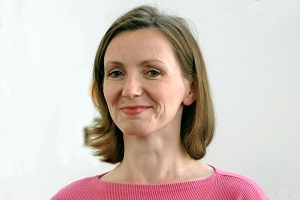Onafhankelijk van geboortedata
De Noord-Ierse schrijfster Anna Burns werd geboren in Belfast in 1962. Zij groeide op in de katholieke arbeiderswijk Ardoyne in Belfast. In 1987 verhuisde ze naar Londen. Ten tijde van het schrijven van haar novelle “Mostly Hero” (2014) woonde ze in East Sussex, aan de Engelse zuidoostkust. Haar eerste roman, “No Bones” (2001), is een verslag van het leven van een meisje dat opgroeit in het Belfast van The Troubles. Onder de Ierse literatuur over de Troubles wordt “No Bones” als een belangrijk werk gezien, dat om het vastleggen van de alledaagse spreektaal van de mensen in Belfast wel is vergeleken met Dubliners van James Joyce. De roman won in 2001 de Winifred Holtby Memorial Prize van de Royal Society of Literature voor de beste regioroman in het Verenigd Koninkrijk en Ierland van dat jaar. Een jaar later werd de roman genomineerd voor de Orange Prize for Fiction.
Uit: Mostly Hero
“The villains from downtown eastside put a magic spell on femme fatale so that she would kill superhero whilst under the influence of this magic spell. She would be totally insensible of doing so. The villains considered this plan delicious and foolproof, but it wasn’t entirely foolproof because the evil wizards from whom they had purchased it said it was a new spell, not as yet perfected, therefore not entirely reliable. They could guarantee that whosoever was under it would experience an irresistible urge to kill the person they were programmed to kill. It was just they might not try to kill this person all the time. The villains did calculations and decided there was a good enough percentage of chances that she might kill him more than a percentage of chances that she might forget to kill him. So yes, delicious and almost foolproof. What made it especially exquisite for the villains was that immediately this woman killed her lover she would come to and realise what she’d done. She would scream, be maddened, be heart-broken, be broken – then she’d be arrested and have to go to the jail. Even this though, wasn’t the main deliciousness. This femme fatale was small fry in the eyes of these villains. What would be truly massively orgasmic was that hero would be taken by surprise. Ordinarily it was very hard to take him by that – owing to his training and superpowers and so forth. But in this case he’d be off guard, perhaps at home, perhaps partially undressed, perhaps doing something domestic, making coffee perhaps in his kitchen, all the while pondering the magnificence of his woman with his underbelly receptive and exposed. Dumbfounded, he’d be astonished that here, after all these years, he’d managed at last to let someone get close to him. He’d turn to say as much to his very own femme fatale who at that moment would be tiptoeing up behind him. Then he’d look dumbfounded in a completely different way because it would be at that moment she’d plunge the daggers in. That would be the end of him, laughed the villains, and effectively it would be the end of her also, at least as a happy woman – so far as femmes fatales could be said to be happy women. So they rubbed their hands in glee, these villains, and purchased the spell and brought it home to their downtown eastside residence where, in the rarefied atmosphere required for spells, they performed the ritual by doing exactly what it said on the tin.”

Anna Burns (Belfast, 1962)
